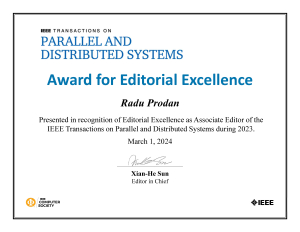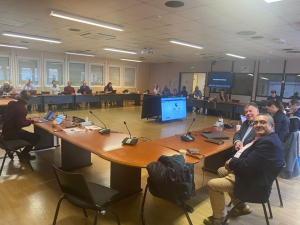Authors: Reza Farahani (AAU, Austria), and Vignesh V Menon (Fraunhofer HHI, Berlin, Germany)
Venue: The 12th European Workshop on Visual Information Processing (EUVIP 2024)
08-11 September, 2024 in Geneva, Switzerland
Distributed and Parallel Systems
Authors: Reza Farahani (AAU, Austria), and Vignesh V Menon (Fraunhofer HHI, Berlin, Germany)
Venue: The 12th European Workshop on Visual Information Processing (EUVIP 2024)
08-11 September, 2024 in Geneva, Switzerland
Based on the 2023 TPDS editorial data and his excellent performance, Radu Prodan received the 2024 IEEE TPDS Award for Editorial Excellence. His achievement will be recognized by IEEE and his name will appear at the IEEE award website https://next-test.computer.org/digital-library/journals/td/tpds-award-for-editorial-excellence.
Congratulations!

Authors: Seyedehhaleh Seyeddizaji, Joze Martin Rozanec, Reza Farahani, Dumitru Roman and Radu Prodan
Venue: The 2nd Workshop on Serverless, Extreme-Scale, and Sustainable Graph Processing Systems Co-located with ICPE 2024
Abstract: While graph sampling is key to scalable processing, little research has tried to thoroughly compare and understand how it preserves features such as degree, clustering, and distances dependent on the graph size and structural properties. This research evaluates twelve widely adopted sampling algorithms across synthetic and real datasets to assess their qualities in three metrics: degree, clustering coefficient (CC), and hop plots. We find the random jump algorithm to be an appropriate choice regarding degree and hop-plot metrics and the random node for CC metric. In addition, we interpret the algorithms’ sample quality by conducting correlation analysis with diverse graph properties. We discover eigenvector centrality and path-related features as essential features for these algorithms’ degree quality estimation, node numbers (or the size of the largest connected component) as informative features for CC quality estimation and degree entropy, edge betweenness and path-related features as meaningful features for hop-plot metric. Furthermore, with increasing graph size, most sampling algorithms produce better-quality samples under degree and hop-plot metrics.
Title: Cloud Storage Tier Optimization through Storage Object Classification
Authors: Akif Quddus Khan, Mihhail Matskin, Radu Prodan, Christoph Bussler, Dumitru Roman, Ahmet Soylu
Abstract: Cloud storage adoption has increased over the years given the high demand for fast processing, low access latency, and ever-increasing amount of data being generated by, e.g., Internet of Things (IoT) applications. In order to meet the users’ demands and provide a cost-effective solution, cloud service providers (CSPs) offer tiered storage; however, keeping the data in one tier is not cost-effective. In this respect, cloud storage tier optimization involves aligning data storage needs with the most suitable and cost-effective storage tier, thus reducing costs while ensuring data availability and meeting performance requirements. Ideally, this process considers the trade-off between performance and cost, as different storage tiers offer different levels of performance and durability. It also encompasses data lifecycle management, where data is automatically moved between tiers based on access patterns, which in turn impacts the storage cost. In this respect, this article explores two novel classification approaches, rule-based and game theory-based, to optimize cloud storage cost by reassigning data between different storage tiers. Four distinct storage tiers are considered: premium, hot, cold, and archive. The viability and potential of the proposed approaches are demonstrated by comparing cost savings and analyzing the computational cost using both fully-synthetic and semi-synthetic datasets with static and dynamic access patterns. The results indicate that the proposed approaches have the potential to significantly reduce cloud storage cost, while being computationally feasible for practical applications. Both approaches are lightweight and industry- and platform-independent.
Computing, https://link.springer.com/journal/607
Radu Prodan has been invited and will participate as a general chair at the ICONIC 2024, April 26-27, 2024, at Lovely Professional University, Punjab, India.
The Conference will provide a platform for scientists, researchers, academicians, industrialists, and students to assimilate the knowledge and get the opportunity to discuss and share insights through deep-dive research findings on the recent disruptions and developments in computing. All technical sessions will largely be steering Network Technologies, Artificial Intelligence and ethics, Advances in Computing, Futuristic Trends in Data Science, Security and Privacy, Data Mining and Information Retrieval.
DFARM: A deadline-aware fault-tolerant scheduler for cloud computing
Authors: Ahmad Awan, Muhammad Aleem, Altaf Hussain, Radu Prodan
Abstract:
Cloud computing has become popular for small businesses due to its cost-effectiveness and the ability to acquire necessary on-demand services, including software, hardware, network, etc., anytime around the globe. Efficient job scheduling in the Cloud is essential to optimize operational costs in data centers. Therefore, scheduling should consider assigning tasks to Virtual Machines (VMs) in a Cloud environment in such a manner that could speed up execution, maximize resource utilization, and meet users’ SLA and other constraints such as deadlines. For this purpose, the tasks can be prioritized based on their deadlines and task lengths, and the resources could be provisioned and released as needed. Moreover, to cope with unexpected execution situations or hardware failures, a fault-tolerance mechanism could be employed based on hybrid replication and the re-submission method. Most of the existing techniques tend to improve performance. However, their pitfall lies in certain aspects such as either those techniques prioritize tasks based on a singular value (e.g., usually deadline), only utilize a singular fault tolerance mechanism, or try to release resources that cause more overhead immediately. This research work proposes a new scheduler called the Deadline and fault-aware task Adjusting and Resource Managing (DFARM) scheduler, the scheduler dynamically acquires resources and schedules deadline-constrained tasks by considering both their length and deadlines while providing fault tolerance through the hybrid replication-resubmission method. Besides acquiring resources, it also releases resources based on their boot time to lessen costs due to reboots. The performance of the DFARM scheduler is compared to other scheduling algorithms, such as Random Selection, Round Robin, Minimum Completion Time, RALBA, and OG-RADL. With a comparable execution performance, the proposed DFARM scheduler reduces task-rejection rates by $2.34 – 9.53$ times compared to the state-of-the-art schedulers using two benchmark datasets.
Authors: Zeinab Bakhshi, Guillermo Rodriguez-Navas, Hans Hansson, Radu Prodan
Abstract:
This paper analyzes a persistent storage method’s timing performance for distributed container-based architectures in industrial control applications. The method focuses on ensuring data availability and consistency while accommodating faults. The analysis considers four aspects: placement strategy, design options, data size, and evaluation under faulty conditions. Experimental results considering the timing constraints in industrial applications indicate that the storage solution can meet critical deadlines, particularly under specific failure patterns. Moreover, the method is applicable for evaluating timing constraints in other container-based critical applications that require persistent storage.Further comparison results reveal that, while the method may underperform current centralized solutions under fault-free conditions, it outperforms the centralized solutions in failure scenarios.
On February 1st, 2024, Sahar Nasirihaghighi presented our work on ‘Event Recognition in Laparoscopic Gynecology Videos with Hybrid Transformers’ at this year’s International Conference on Multimedia Modeling (MMM 2024) in Amsterdam, The Netherlands.
Authors: Sahar Nasirihaghighi, Negin Ghamsarian, Heinrich Husslein, Klaus Schoeffmann
Abstract: Analyzing laparoscopic surgery videos presents a complex and multifaceted challenge, with applications including surgical training, intra-operative surgical complication prediction, and post-operative surgical assessment. Identifying crucial events within these videos is a significant prerequisite in a majority of these applications. In this paper, we introduce a comprehensive dataset tailored for relevant event recognition in laparoscopic gynecology videos. Our dataset includes annotations for critical events associated with major intra-operative challenges and post-operative complications. To validate the precision of our annotations, we assess event recognition performance using several CNN-RNN architectures. Furthermore, we introduce and evaluate a hybrid transformer architecture coupled with a customized training-inference framework to recognize four specific events in laparoscopic surgery videos. Leveraging the Transformer networks, our proposed architecture harnesses inter-frame dependencies to counteract the adverse effects of relevant content occlusion, motion blur, and surgical scene variation, thus significantly enhancing event recognition accuracy. Moreover, we present a frame sampling strategy designed to manage variations in surgical scenes and the surgeons’ skill level, resulting in event recognition with high temporal resolution. We empirically demonstrate the superiority of our proposed methodology in event recognition compared to conventional CNN-RNN architectures through a series of extensive experiments.
Representing Ireland with Prof. Horacio González-Vélez of National College of Ireland at the partner meeting of the Cost Action Cerciras – Connecting Education and Research Communities for an Innovative Resource Aware Society in Montpellier today.

Great alignment with several EU skills projects like ARISA – AI Skills, ESSA Software Skills Digital4Business and Digital4Security by facilitating transversal insights.